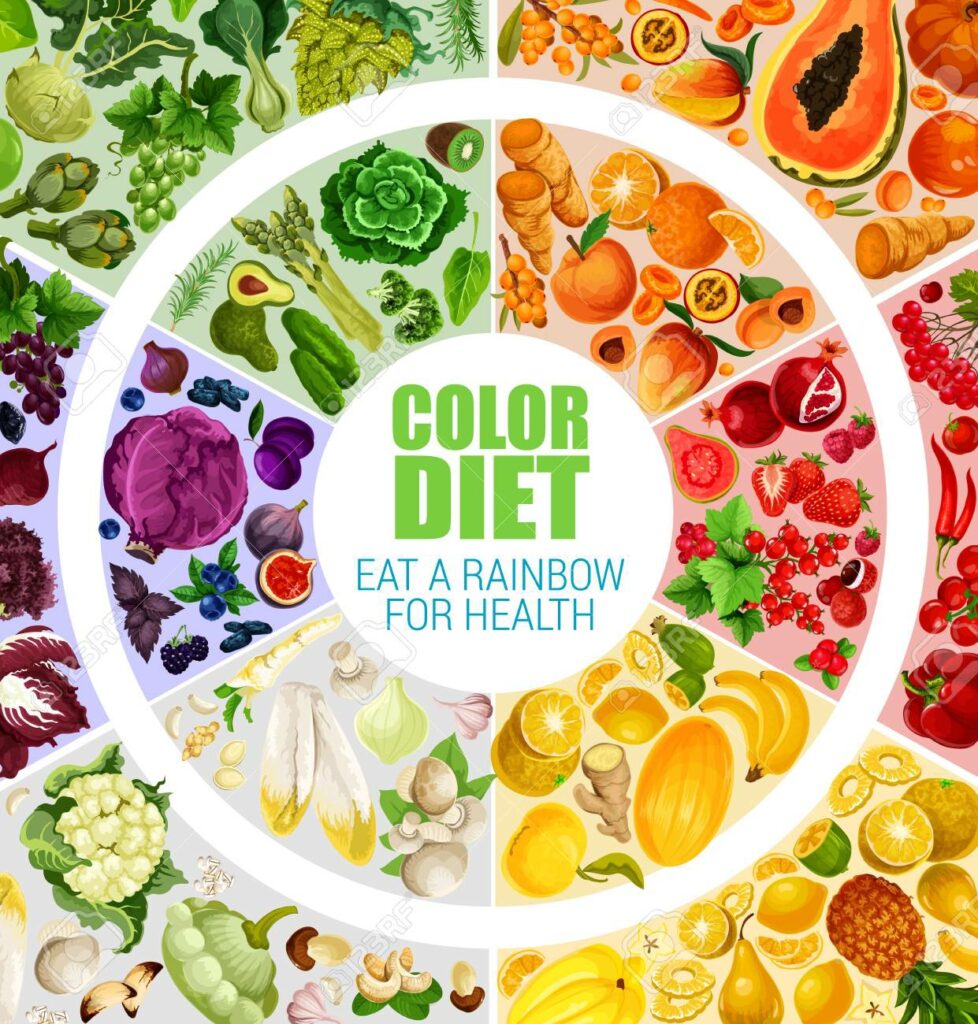Fruits and vegetables get their colouration from phytochemicals and natural bioactive compounds which apart from promoting good health also give eye-catching hues to them. The fact is that the most vibrantly coloured fruits and vegetables are the richest source of vitamins, minerals, fibre and anti-oxidants.
A person should eat nine servings of fruits and vegetables each day. Instead of taking rich and sugary treats after meals or for between-meal snacks, it is more prudent to use whole fresh fruits to satisfy the hunger as well as sweet tooth.

What do the colour of fruits mean?
Different colours have different health benefits. Some of the health benefits of different fruits are:
- Red: Red fruits and vegetables such as tomatoes, red beans, strawberries are the rich source of Vitamin A, Vitamin C, potassium as well as antioxidants.
- Green: The colour of the vegetables is almost green. Green colour is packed with a lot of heart protective constituents such as Vitamin-K and potassium which help in blood clotting process. Dark green leafy vegetables have the highest concentration of fibre and anti-oxidants.
- Yellow/Orange: Yellow and Orange fruits and vegetables include peaches, squash, carrots, pineapples etc. These are loaded with Vitamin C, Vitamin A and potassium. These help in boosting immunity and enhance vision as well.
- White: Fruits and Vegetables that are white in colour such as bananas, mushrooms, onions are good for heart and help in reducing cholesterol level.
- Blue/Purple: Blue/Purple fruits and vegetables include cranberries, purple grapes, raisins, egg plant boost urinary tract health, memory health and also promote healthy aging.
All fruits and vegetables are high in fibre and high-fibre diets have been associated with decreased risk and recurrence of cancer.
.Eating fruits and vegetables also provide anti-oxidants which boost the body’s immune system, protect cells from free radicals, promote the growth of healthy cells and may also help to lower the risk of stroke.
Fresh and seasonal fruits and vegetables should be eaten. Vegetables should be cooked lightly. Steaming or grilling the vegetables are the better options.
Do’s and Don’ts for fruits and vegetables:
- Some fruits and vegetables are not low in calories: Avocado is a good type of fat. Raisins and cherries are the other examples of fruits that are healthy but high in calories. Eat higher-calorie fruits and vegetables in moderation if you are obese.
- Use of Starchy Vegetables should be limited: Some starch containing vegetables such as potatoes, corn should be used in limit.
- Preparation of Vegetables: For cooking vegetables, use a lighter preparation and don’t use a lot of oil, or fry them. Instead, steaming or grilling vegetables is a better option. It is because nutrients present in vegetables leach out by over-cooking them.
- Eat with seasons: Choose fresh and seasonal fruits and vegetables to ensure eating good variety of colours throughout the year.
- Dry fruits: The dried fruits tend to have a higher concentration of calories and sugar. Dry fruits should be soaked for 8-10 hours before consuming.
- Don’t mix fruits with milk: Ayurveda suggests that fruits should not be mixed with milk as fruits have a little bit of acidic content in them. Even though banana can be taken with milk but it is heavy to digest.
- Don’t eat fruits just after having meals: Eating fruits just after having meals can directly disrupt the ongoing digestion of the food eaten and it will cause fermentation. It will therefore affect overall digestive health and can cause acidity, gas and indigestion.
- Packed Juices: The canned juices available in the market often contains artificial sweeteners and preservatives. Storing juices makes them to lose their nutrition and they also turn acidic. Moreover, preservatives are not healthy for the body.
- Eat fruits in the morning: The best time to eat fruits is right in the morning. Most of the fruits except citrus fruits can be eaten on an empty stomach in the morning. Fruits that can be eaten in the morning are bananas, apples, pears etc. Apples are especially great to be taken in the morning as these are rich in pectin which help in keeping the intestines healthy.
Follow these simple rules and get a lot of nutrients naturally!
Disclaimer:-
This article is not a substitute to the standard Medical Diagnosis or personalized Ayurvedic Treatment! It is intended only for Information!
For experts consultation, please write us at care@blessayurveda.com.
1,527 total views, 1 views today